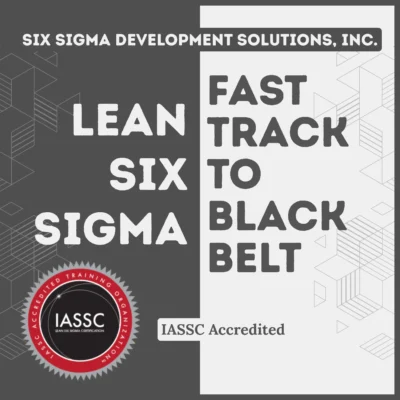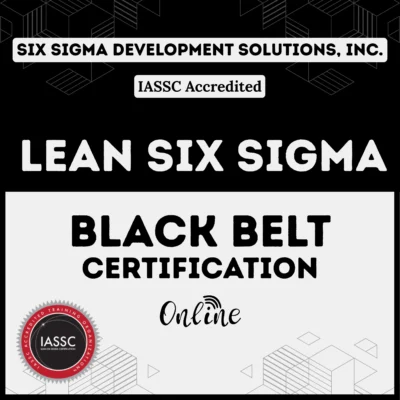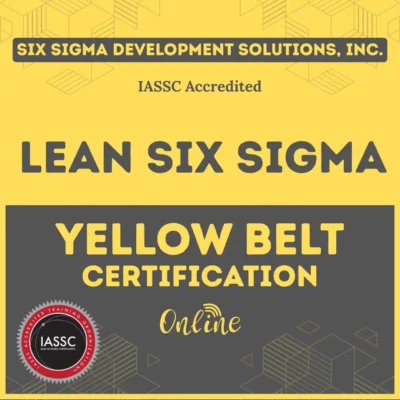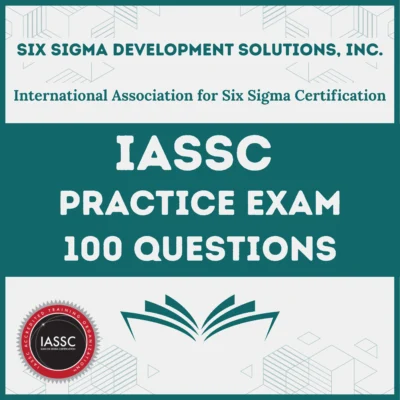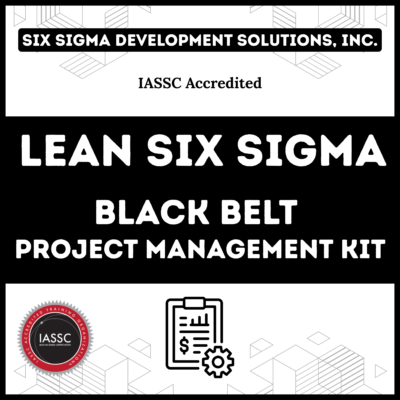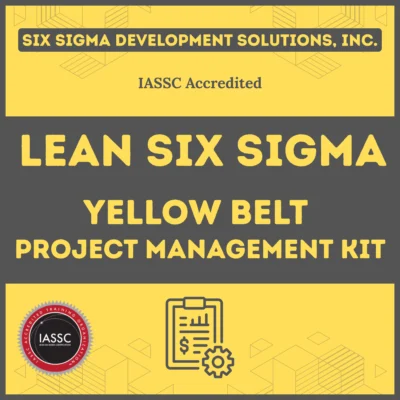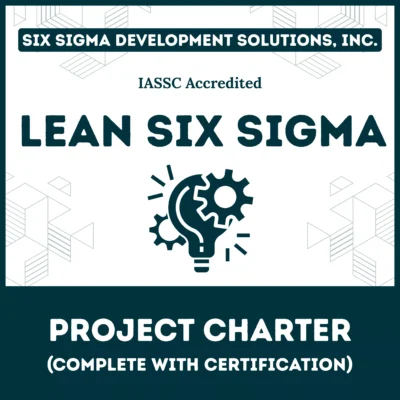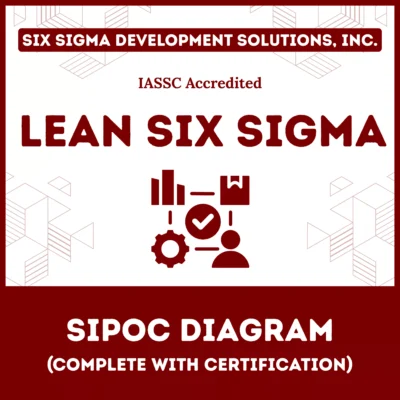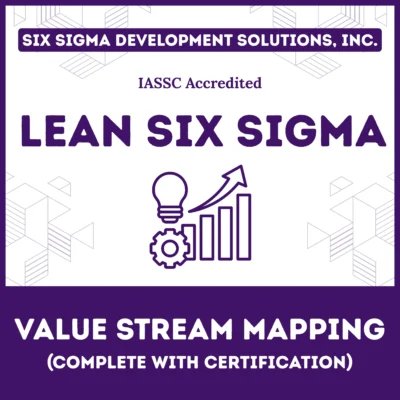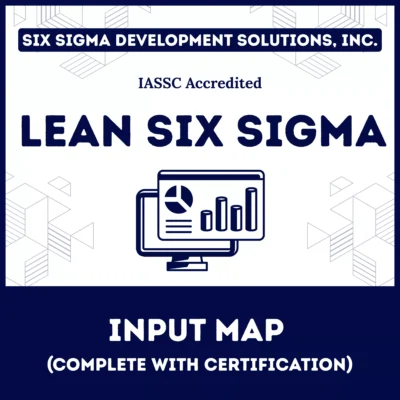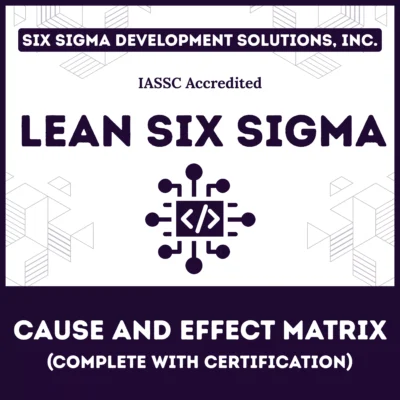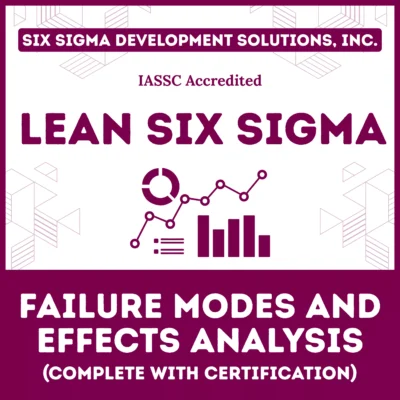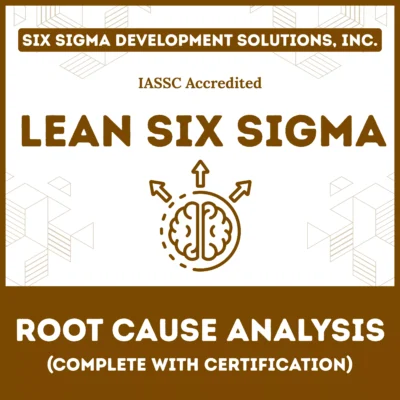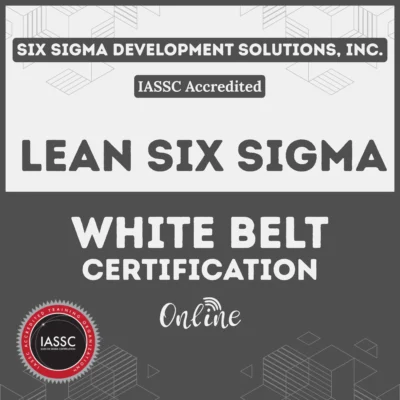The best Lean Six Sigma training in Toronto stands out with an impressive track record, boasting a 98% student satisfaction rate and a 95% certification exam pass rate. This data-driven approach to process improvement is revolutionizing businesses worldwide, and now you have the opportunity to be a part of this transformation. Join our upcoming cohort and acquire in-demand skills that will set you apart in today’s competitive job market.
Lean Six Sigma training in Toronto equips you with a powerful methodology designed to optimize processes by identifying and eliminating inefficiencies and defects. By leveraging statistical tools and data analysis, it helps enhance both quality and operational efficiency, enabling businesses to achieve sustainable growth and success.
Toronto offers a range of institutions that provide Six Sigma training, catering to all skill levels—from beginners to advanced professionals. However, selecting the right training program, like the best Lean Six Sigma training in Toronto, is essential for your career progression. With expert instructors and a results-driven curriculum, you’ll gain the practical knowledge and certifications needed to advance in your career and make a tangible impact on any organization.
Table of contents
- What is Six Sigma?
- Key Components of Lean Six Sigma Training
- Why Toronto for Six Sigma Training?
- Which is the Best Six Sigma Training Provider in Toronto?
- SSDSI’s programs Highly Sought After by Toronto Professionals
- Client Testimonial
- Data-Driven SSDSI Facts and Statistics
- Difference Between SSDSI Six Sigma Training and Other Providers
- Companies Adopting Six Sigma in Toronto
- Choosing the Right Lean Six Sigma Training Provider in Toronto
- Choosing the Right Lean Six Sigma Program
- Evaluating Training Content
- Benefits of Six Sigma Certification
- Implementing Six Sigma in Your Career
- Final Words
- Related Articles
What is Six Sigma?
Six Sigma is a data-driven methodology aimed at improving business processes by identifying and eliminating defects or inefficiencies. It uses statistical tools to analyze processes, reduce variation, and enhance quality. The goal is to achieve near-perfect performance, typically defined as 3.4 defects per million opportunities.
Six Sigma follows a structured approach, often using the DMAIC (Define, Measure, Analyze, Improve, Control) framework for process improvement. It helps organizations streamline operations, increase customer satisfaction, and boost profitability.
By focusing on continuous improvement, Six Sigma empowers companies to achieve higher efficiency, reduced costs, and sustainable growth.
Key Components of Lean Six Sigma Training
Six Sigma training consists of multiple levels, each representing a different degree of expertise. The “Yellow Belt” level introduces the foundational principles and concepts of Six Sigma.
The “Green Belt” level focuses on project management and process improvement, equipping participants with the skills to lead smaller projects. The “Black Belt” level prepares individuals to manage complex, large-scale projects and drive significant process improvements.
At the highest level, “Master Black Belt” professionals serve as mentors, guiding and supporting others in their Six Sigma journey.
The training incorporates a range of statistical tools and emphasizes effective problem-solving techniques. Participants learn and apply the DMAIC (Define, Measure, Analyze, Improve, Control) framework to real-world scenarios, gaining practical experience in process optimization and continuous improvement.
Why Toronto for Six Sigma Training?
Toronto stands out as a prime location for Six Sigma training due to its thriving, diverse economy. The city’s concentration of industries – from finance and technology to manufacturing and healthcare – creates a high demand for process improvement professionals. This translates to excellent career opportunities for Six Sigma certified individuals.
Toronto’s commitment to innovation and quality makes it a hub for businesses seeking to optimize operations. Training in Toronto offers access to experienced instructors, often industry veterans, and provides networking opportunities within a dynamic business environment. Moreover, the city’s multicultural nature fosters a learning environment rich in diverse perspectives, crucial for effective Six Sigma implementation.
Which is the Best Six Sigma Training Provider in Toronto?
For top-tier Six Sigma training in Toronto, Six Sigma Development Solutions Inc. (SSDSI) stands out as a premier provider. Offering both public and onsite Lean Six Sigma courses, SSDSI delivers comprehensive, accredited training programs recognized by the International Association for Six Sigma Certification.
Their courses go beyond theory, utilizing engaging learning tools such as interactive simulations and real-world case studies, ensuring a dynamic and effective learning experience. Participants will gain expertise in powerful root cause analysis techniques, with hands-on experience using Minitab for statistical analysis.
SSDSI empowers professionals to drive meaningful process improvements by equipping them with essential skills in the DMAIC methodology. Designed by Master Black Belts, their curriculum offers a deep, practical understanding of process optimization and problem-solving techniques. With a results-oriented approach, SSDSI ensures that students are ready to address real-world challenges and lead impactful improvements within any organization.
SSDSI’s commitment to excellence, combined with its expert-led training and certification, makes it the leading choice for Six Sigma education in Toronto.
Key Strengths of SSDSI

- Expert-Led Instruction: SSDSI’s instructors are seasoned professionals with extensive industry experience, offering invaluable insights that go beyond textbook learning. Their real-world expertise ensures that students gain practical, applicable knowledge that can be directly implemented in the workplace.
- Practical Application: SSDSI’s training programs focus on hands-on learning, encouraging students to apply their newly acquired skills immediately through interactive projects and exercises. Tools like Minitab are emphasized, helping students develop proficiency in statistical analysis and process improvement techniques.
- Flexible Learning Options: Understanding that professionals have diverse schedules and learning preferences, SSDSI offers both online and on-demand training. These flexible options allow students to learn at their own pace and convenience, making Six Sigma training accessible for everyone.
- Comprehensive Certification: SSDSI provides training across all Six Sigma belt levels, from Yellow Belt to Master Black Belt. This tiered approach allows for progressive skill development, empowering individuals to advance their expertise and credentials as they grow in their careers.
- Focus on Measurable Results: The training at SSDSI is designed with a clear focus on delivering measurable outcomes. By equipping students with tools and techniques that drive process improvements, SSDSI ensures that the skills gained lead to a positive return on investment (ROI) for employers.
With SSDSI’s commitment to quality, practical learning, and a results-driven approach, they are the top choice for professionals in Toronto looking to advance their careers through Six Sigma certification.
Their emphasis on real-world applications and data-driven results ensures that students are well-prepared to lead impactful improvement initiatives and contribute to organizational excellence.
What makes SSDSI the Best Lean Six Sigma Training Provider in Toronto?

Selecting the “best” Six Sigma training provider often comes down to personal goals and preferences. However, SSDSI (Six Sigma Development Solutions Inc.) consistently stands out as one of the leading choices for Six Sigma training in Toronto due to several unique qualities and advantages that they offer. Here’s a comprehensive look at why SSDSI is a top contender in the Toronto Six Sigma training market:
Hands-On, Real-World Application
One of SSDSI’s core strengths is its focus on practical, real-world application. Rather than relying solely on theoretical learning, SSDSI ensures that students can immediately apply Six Sigma principles in their own work environments. Through engaging hands-on projects and interactive case studies, participants gain firsthand experience with tools like Minitab, which is widely used for statistical analysis.
Access to Expert Mentorship and Guidance
At SSDSI, students benefit from the mentorship of Master Black Belts—seasoned professionals with vast industry experience. These mentors not only teach but also share valuable insights and strategies from their years of working with Six Sigma methodologies.
Comprehensive and Structured Certification Programs
SSDSI offers a full spectrum of certification programs, catering to professionals at all stages of their Six Sigma journey. From Yellow Belt (beginner) to Green Belt (intermediate), Black Belt (advanced), and Master Black Belt (expert), SSDSI’s curriculum is designed to support progressive skill development.
Flexible Learning Options for Busy Professionals
Understanding the challenges faced by working professionals, SSDSI offers flexible learning options to fit a variety of schedules. Whether you’re looking for live online courses, self-paced learning, or on-demand content, SSDSI’s training options are designed to accommodate busy individuals.
IASSC Accreditation and Industry Recognition
SSDSI’s training programs are accredited by the International Association for Six Sigma Certification (IASSC), a globally recognized accrediting body for Six Sigma training and certification. This accreditation guarantees that the training provided meets rigorous standards of quality and is highly respected within the industry.
SSDSI’s programs Highly Sought After by Toronto Professionals

Yellow Belt:
Our Lean Six Sigma Yellow Belt course is the ideal starting point for those new to process improvement. It provides essential foundational knowledge, helping you understand Six Sigma’s core principles and prepare to make valuable contributions to improvement projects. Click to Join
Green Belt:
SSDSI’s Green Belt certification, available both in-person and online, equips professionals with the tools and skills necessary to lead impactful projects and implement effective cost-saving solutions. This program prepares you to manage smaller-scale improvement projects while supporting larger organizational changes. Click to Join
Black Belt:
Our comprehensive Black Belt program is renowned for its in-depth curriculum that trains experts to tackle complex problems and lead significant organizational transformations. Graduates gain the expertise to manage high-level projects, lead teams, and influence change at the executive level. Click to Join
Online Green/Black Belt:
SSDSI’s online Green and Black Belt courses provide the same high-quality training as our in-person programs, with the added flexibility of learning at your own pace. These online courses are designed for busy professionals, allowing you to earn your certification without disrupting your work schedule. Click to Join Online Green Belt Course
Click to Join Online Black Belt Course
Fast-Track to Black Belt:
For ambitious professionals looking to fast-track their career, our Fast-Track to Black Belt program offers an intensive, immersive experience. This accelerated course helps you quickly achieve Black Belt certification, focusing on advanced problem-solving, leadership, and practical applications to drive real-world change. Click to Join
Client Testimonial
The instructor was fantastic, knowledgeable, and enthusiastic. He demonstrated a genuine desire to empower students in the class to gain the skills to better themselves professionally as well as improve the world. I would highly recommend SSDSI if you want to learn how to harness this powerful tool.
-Jonah Sakala
Sr. Process Engineer at Lantheus
Fantastic instruction!! Great real-world examples that relate to our industry.
-Jonathan Spiesz
Continuous Improvement at Voss Industries, LLC
The instructor was very knowledgeable, and you could tell he genuinely cared about the material. Julia, the training coordinator, was very responsive and helpful. Both were very pleasant to work with.
-Eileen King
Purchasing Agent at PMC Crystal
I thought the content was amazing. It helped me realize that I have a lot of work to do in the world of statistics and leverage it to streamline so many areas of my daily job.
-Christopher Mike Coutinho
Director Order to Cash at Nutanix
The greatest strengths of this training were that the instructor asked us all individually what we wanted to gain from the training, conducted the training, and then revisited each one of us individually to ask if we gained what we set out to gain.
-Jeremy Fitzpatrick
Senior Associate Scientist at Bridgebio
Data-Driven SSDSI Facts and Statistics
- Participants in our online Green Belt program boast an impressive 95% certification completion rate, underscoring the program’s high effectiveness and success in preparing professionals for Six Sigma excellence.
- Our Fast-Track to Black Belt program has helped reduce the average time to certification by 40%, enabling professionals to accelerate their career progression and take on leadership roles faster.
- With a 90% knowledge retention rate, as indicated by post-course assessments, our online training modules demonstrate exceptional long-term impact, ensuring that students retain and apply their Six Sigma expertise effectively.
- Through personalized project coaching, our students see an average 15% increase in the return on investment (ROI) of their projects, showcasing the practical value of our training.
- SSDSI’s training programs have contributed to a 25% reduction in process defect rates within client organizations, demonstrating the tangible improvements our graduates bring to the workplace.
- Our data indicates that 85% of alumni report significant improvements in job satisfaction and career growth within 18 months of completing their certification, confirming the lasting benefits of SSDSI’s Six Sigma training on professional success
Difference Between SSDSI Six Sigma Training and Other Providers
| Feature | SSDSI | Other Providers |
|---|---|---|
| Real-World Application Focus | Strong emphasis on hands-on projects and applying Six Sigma principles in real-world scenarios. | May focus more on theoretical concepts than on practical, real-world applications. |
| Expert Instruction | Taught by experienced Master Black Belts with extensive industry experience. | Instructors may have less practical experience or lower certifications. |
| Comprehensive Certification Pathways | Offers a full range of Six Sigma training (Yellow, Green, Black, Master Black Belt) with a clear progression. | May offer only a limited number of certification levels or lack structured progression. |
| Flexible Learning Options | Provides a variety of learning options, including online, self-paced, and in-person formats to suit diverse needs. | Limited learning formats and less flexibility in scheduling. |
| IASSC Accreditation | Accredited by the International Association for Six Sigma Certification, ensuring adherence to global standards. | May lack accreditation or be accredited by less recognized bodies. |
| Statistical Tool Proficiency | Focus on mastering advanced statistical tools like Minitab for data analysis. | May offer less emphasis on practical use of statistical tools. |
| Root Cause Analysis Expertise | In-depth training in powerful root cause analysis techniques and tools. | Provides basic or introductory root cause analysis training. |
| Post-Training Support | Offers ongoing support and resources to help students implement Six Sigma projects effectively. | Limited or no post-training support. |
| Industry-Specific Customization | Tailors training programs to meet the specific needs and challenges of various industries. | May offer more generic programs with limited industry-specific adjustments. |
| Proven Track Record | Demonstrates a 95% certification completion rate and significant ROI improvements from student projects. | May not provide detailed data on certification success rates or project outcomes. |
| Career Advancement Impact | 85% of alumni report higher job satisfaction and career growth within 18 months of certification. | May not have robust data on career outcomes or alumni success. |
Companies Adopting Six Sigma in Toronto
Several leading companies in Toronto across various industries have embraced Six Sigma to streamline processes, enhance efficiency, and drive continuous improvement. Some of the prominent companies adopting Six Sigma principles include:
- TD Bank
As one of Canada’s largest banks, TD Bank uses Six Sigma to improve operational processes, reduce inefficiencies, and enhance customer experience. The bank focuses on driving process improvements in its banking operations and financial services. - RBC (Royal Bank of Canada)
RBC has integrated Six Sigma methodologies to enhance its financial services, improve compliance and risk management, and optimize its internal processes, driving better outcomes for both customers and employees. - Sun Life Financial
Sun Life Financial applies Six Sigma to improve service delivery and operational efficiency, ensuring better management of customer data, insurance processes, and claims handling. - CIBC (Canadian Imperial Bank of Commerce)
CIBC uses Six Sigma to enhance service quality and streamline internal processes. The bank focuses on reducing errors, minimizing waste, and increasing productivity in its various banking functions. - Toronto Hydro
Toronto Hydro, responsible for electricity distribution, applies Six Sigma to reduce operational inefficiencies, enhance the quality of service, and manage resources effectively while minimizing environmental impact. - Shoppers Drug Mart
As one of Canada’s largest pharmacy chains, Shoppers Drug Mart uses Six Sigma to improve supply chain processes, inventory management, and customer service, aiming to create a more seamless experience for both customers and employees. - General Electric (GE) Canada
GE, a global leader in technology and innovation, uses Six Sigma across its Canadian operations to enhance product quality, streamline manufacturing processes, and reduce defects in its various industries, including energy and healthcare. - BMO (Bank of Montreal)
BMO applies Six Sigma in its operations to improve service delivery, reduce process variation, and enhance efficiency across its banking and financial services, ensuring faster and more accurate customer interactions.
Benefits Beyond the Bottom Line
The benefits of Six Sigma go far beyond just financial improvement. Companies in Toronto are seeing significant advantages, including:
- Greater Employee Engagement: Involving employees in Six Sigma initiatives helps cultivate a sense of ownership and empowerment, leading to higher levels of engagement and motivation.
- Enhanced Problem-Solving Abilities: Six Sigma equips employees with a systematic approach to solving problems, sharpening their skills and enabling them to address challenges effectively across various job functions.
- Better Communication and Collaboration: Six Sigma projects often require cross-functional teams, fostering improved communication and collaboration between departments and encouraging a more unified work environment.
- Improved Competitive Edge: By consistently improving the quality of products and services, companies are strengthening their position in the marketplace, gaining a distinct competitive advantage.
Six Sigma for All
While large corporations have typically pioneered Six Sigma adoption, its principles offer significant value to small and medium-sized enterprises (SMEs) in Toronto as well. By implementing Six Sigma, these businesses can sharpen their competitive edge, streamline operations, and achieve long-term, sustainable growth.
Choosing the Right Lean Six Sigma Training Provider in Toronto
When choosing a Six Sigma training provider, consider the following factors:
- Reputation of the provider
- Experience of instructors
- Course curriculum
- Training delivery method (online vs. in-person)
- Certification options available
- Student reviews and feedback
- Course fees and value
- Availability of practical exercises
- Project support during and after the course
By evaluating these key aspects, you can make an informed decision that best suits your learning style and career goals.
Choosing the Right Lean Six Sigma Program

When selecting a Six Sigma training program in Atlanta, it’s essential to consider the following factors:
- Certification Level: Determine which certification level aligns with your career goals—Yellow Belt for beginners, Green Belt for those leading projects, or Black Belt for advanced expertise in process improvement.
- Learning Format: Choose between in-person, virtual, or blended learning options, depending on your learning preferences and schedule flexibility.
- Duration: Consider the program’s length and how it fits into your professional and personal schedule, ensuring it’s manageable alongside other commitments.
- Accreditation: Verify that the program is accredited by reputable organizations like the American Society for Quality (ASQ) or the International Association for Six Sigma Certification (IASSC) to ensure it meets high-quality standards.
- Cost: Evaluate the total cost of the program, including any extra fees for materials, exams, or certification, ensuring it aligns with your budget and the value you expect to gain.
Evaluating Training Content

The best Six Sigma training programs incorporate the following key elements:
- Comprehensive Curriculum: The course covers all phases of DMAIC (Define, Measure, Analyze, Improve, Control) and includes relevant statistical tools. The curriculum is aligned with industry standards, ensuring it’s both thorough and up-to-date.
- Experienced Instructors: Instructors bring practical, real-world experience to the table, allowing them to explain complex concepts effectively and provide valuable examples from their own careers.
- Practical Application: Training is designed to be hands-on, with participants working on real projects where they can apply Six Sigma tools and methodologies.
- Certification Options: The program offers recognized certifications that validate your expertise and enhance your career prospects, making you a valuable asset to employers.
- Project Support: Providers offer mentoring and support throughout the project process, providing guidance, feedback, and practical insights to help you succeed.
- Flexible Learning Options: Courses are offered in various formats, including online, in-person, and self-paced options, allowing flexibility to accommodate diverse schedules and learning preferences.
Benefits of Six Sigma Certification
Certification offers a range of significant benefits:
- Enhanced Career Prospects: Obtaining Six Sigma certification increases your marketability. Certified professionals are highly sought after by employers who value process improvement skills, opening up a wider range of job opportunities.
- Increased Earning Potential: Certified individuals typically command higher salaries compared to non-certified peers. Their expertise in Six Sigma methodologies makes them valuable assets to organizations, leading to better compensation.
- Improved Problem-Solving Skills: Six Sigma training sharpens analytical thinking and problem-solving abilities. Certified professionals are equipped to tackle complex challenges and identify root causes effectively.
- Greater Efficiency: Certification helps professionals streamline processes by eliminating waste, reducing errors, and optimizing workflows. This drives efficiency and productivity in their organizations.
- Leadership Opportunities: Especially at the Black Belt level, Six Sigma professionals lead improvement projects and initiatives. They play a key role in driving organizational change, positioning themselves for higher leadership roles.
Implementing Six Sigma in Your Career
Professionals can apply Six Sigma principles in a variety of roles across different industries:
- Project Management: Six Sigma improves project outcomes by reducing risks and minimizing delays. Its structured approach helps ensure that projects stay on track, meet deadlines, and deliver quality results.
- Quality Control: Six Sigma focuses on maintaining high standards of product and service quality. By identifying and eliminating defects, it ensures consistent quality and customer satisfaction while reducing errors.
- Process Improvement: Six Sigma enhances operational efficiency by streamlining processes, eliminating waste, and increasing productivity. It helps organizations optimize workflows and reduce unnecessary steps.
- Data Analysis: Six Sigma uses data-driven approaches to make informed decisions. By analyzing data, professionals can identify trends, uncover patterns, and make improvements based on real insights, ensuring decisions are backed by solid evidence.
- Leadership: Six Sigma leaders guide organizations through transformational change. They champion continuous improvement initiatives, promote a culture of excellence, and lead teams in driving lasting, positive change across the organization.
Final Words
Six Sigma training is an excellent investment for individuals looking to enhance their skills in process improvement, and Toronto is home to a wide range of reputable training providers offering courses for all levels of expertise. Whether you’re just beginning or seeking to take your career to the next level, Toronto has a program tailored to your needs.
By choosing the right provider, you’ll acquire the knowledge and skills necessary to apply Six Sigma methodologies within your organization. With a focus on process efficiency, quality control, and data-driven decision-making, Six Sigma equips both individuals and businesses to achieve measurable improvements. Start your journey today by enrolling in a Six Sigma training program in Toronto.



